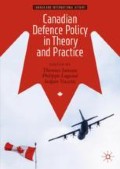Abstract
Despite increasing calls to harness and integrate the entirety of state power in response to defence and security challenges under a Comprehensive Approach, the benefits posed by such integration often go unrealized in Western nations. Simultaneously, hybrid actors, possessing strategic outlooks incompatible with Western security objectives, seem increasingly able to harness multi-spectral elements of national or group power to achieve their desired ends. This chapter examines insights provided by recent Canadian operations, and those of hybrid actors, to understand how Canada can improve its ability to apply Comprehensive Approach principles. Moreover, it draws linkages to Canadian institutional, bureaucratic and cultural features to stimulate thinking about what will be required in future security environments. In doing so, it argues that strong, decisive leadership, robust institutional structures and inter-organizational processes are necessary to facilitate development of holistic approaches in response to contemporary security challenges.
The views presented here are those of the authors alone and do not represent the views or policies of Defence Research and Development Canada, the Department of National Defence or the Government of Canada.
Access this chapter
Tax calculation will be finalised at checkout
Purchases are for personal use only
References
Archambault, Peter, and Brad Gladman. 2011. A Role for Effects-Based Planning in a National Security Framework. Journal of Military and Strategic Studies 13 (2): 1–26.
Axworthy, Lloyd. 1997. Canada and Human Security: A Need for Leadership. International Journal 52 (2): 183–196.
Bourgault, Jacques, and René Lapierre. 2000. Horizontality and Public Management Final Report. Ottawa: Canadian Centre for Public Management.
CBC News. 2011. NATO Worried over Possible Libya War Crimes Probe. CBCNews. http://www.cbc.ca/news/world/nato-worried-over-possible-libya-war-crimes-probe1.1047228.
Chuka, Neil. 2007. Confusion and Disagreement: The Information Operations Doctrine of the United States, the United Kingdom, Australia, Canada, and NATO. MA thesis, Department of War Studies, Royal Military College of Canada.
Chuka, Neil, and Jennifer Born. 2014. Hybrid Warfare: Implications for CAF Force Development. DRDC-RDDC-2014-R43. Ottawa: Defence Research and Development Canada.
Cody, Edward. 2011. French, British Leaders Meet About West’s Role in Libyan Uprising. The Washington Post. https://www.washingtonpost.com/world/france_britain_call_for_summit_on_natos_role_in_libyan_uprising/2011/04/13/AFy71qVD_story.html?utm_term=.b1fb0a99ae6d&wprss=rss_homepage.
Commission of Inquiry into the Investigation of the Bombing of Air India Flight 182. 2010. Air India Flight 182: A Canadian Tragedy—Volume One: The Overview. Ottawa: Government of Canada.
Duffield, Mark. 2001. Global Governance and the New Wars: The Merging of Development and Security. London: Zed.
Franks, C.E.S. 2004. Putting Accountability and Responsibility Back in the System of Government. Policy Options 25 (9): 64–66.
Freedman, Lawrence. 2014. Ukraine and the Art of Crisis Management. Survival 56 (3): 7–42.
Glenn, Russell. 2009. Thoughts on “Hybrid” Conflict. Small Wars Journal. http://smallwarsjournal.com/blog/journal/docs-temp/188-glenn.pdf?q=mag/docs-temp/188-glenn.pdf.
Grammer, Nicholas. 2008–2009. Integrating Civilian-Military Operations: The Comprehensive Approach and the ATF Experience. Paper Presented to the CPSA Annual Conference. Author’s copy.
Heuser, Beatrice. 2010. The Evolution of Strategy: Thinking War from Antiquity to the Present. New York: Cambridge University Press.
Hoffman, Frank. 2009. Hybrid Warfare and Challenges. Joint Force Quarterly 52 (1): 34–39.
Kaldor, Mary. 1999. New and Old Wars. Stanford: Stanford University Press.
Lagassé, Philippe. 2010. Accountability for National Defence: Ministerial Responsibility, Military Command and Parliamentary Oversight. IRPP Study, No. 4.
Manley, John. 2008. Independent Panel on Canada’s Future Role in Afghanistan. Ottawa: Government of Canada.
Mueller, Karl (ed.) 2015. Precision and Purpose: Airpower in the Libyan Civil War. Santa Monica: RAND Corp.
Murray, Williamson, and Peter Mansoor. 2012. Hybrid Warfare—Fighting Complex Opponents form the Ancient World to the Present. Cambridge: Cambridge University Press.
NATO, Warsaw Summit Communiqué. 2016. https://www.nato.int/cps/en/natohq/official_texts_133169.htm.
Patrick, Stewart, and Kaysie Brown. 2007. Greater than the Sum of Its Parts? Assessing Whole of Government Approaches to Fragile States. New York: International Peace Academy.
Royal Commission on Financial Management and Accountability. 1979. Final Report, 194. Hull: Canadian Government Publishing Centre.
Scales, Robert, Jr. 1998–1999. Trust, Not Technology, Sustains Coalitions. Parameters XXVIII (4): 4–10.
Wentz, Larry K. 1997. Intelligence Operations. In Lessons from Bosnia: The IFOR Experience. Washington, DC: National Defense University.
Author information
Authors and Affiliations
Corresponding author
Editor information
Editors and Affiliations
Rights and permissions
Copyright information
© 2020 The Author(s)
About this chapter
Cite this chapter
Chuka, N., Hrychuk, H. (2020). CAF Operations: A Comprehensive Approach to Enable Future Operations. In: Juneau, T., Lagassé, P., Vucetic, S. (eds) Canadian Defence Policy in Theory and Practice. Canada and International Affairs. Palgrave Macmillan, Cham. https://doi.org/10.1007/978-3-030-26403-1_18
Download citation
DOI: https://doi.org/10.1007/978-3-030-26403-1_18
Published:
Publisher Name: Palgrave Macmillan, Cham
Print ISBN: 978-3-030-26402-4
Online ISBN: 978-3-030-26403-1
eBook Packages: Political Science and International StudiesPolitical Science and International Studies (R0)

